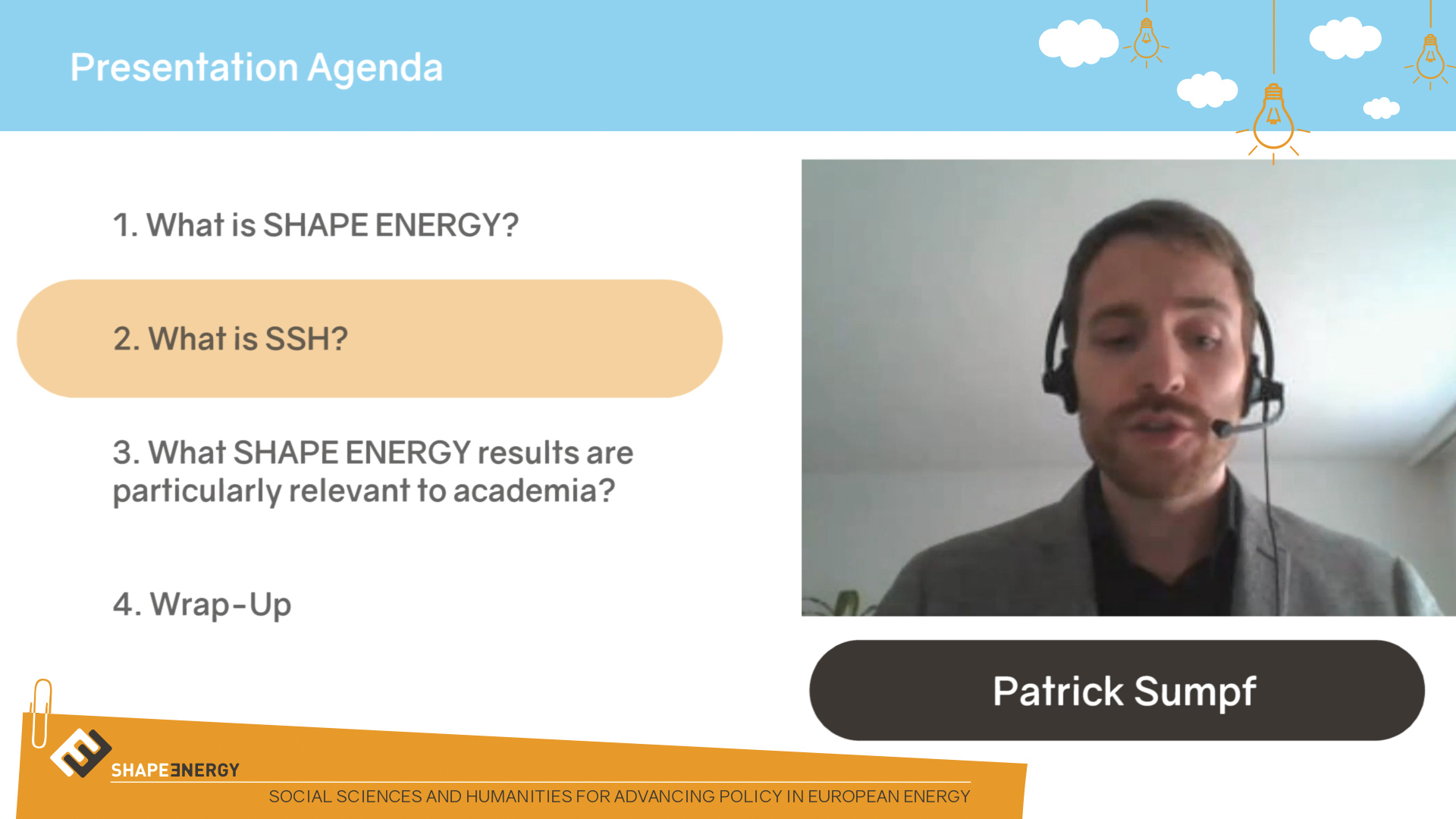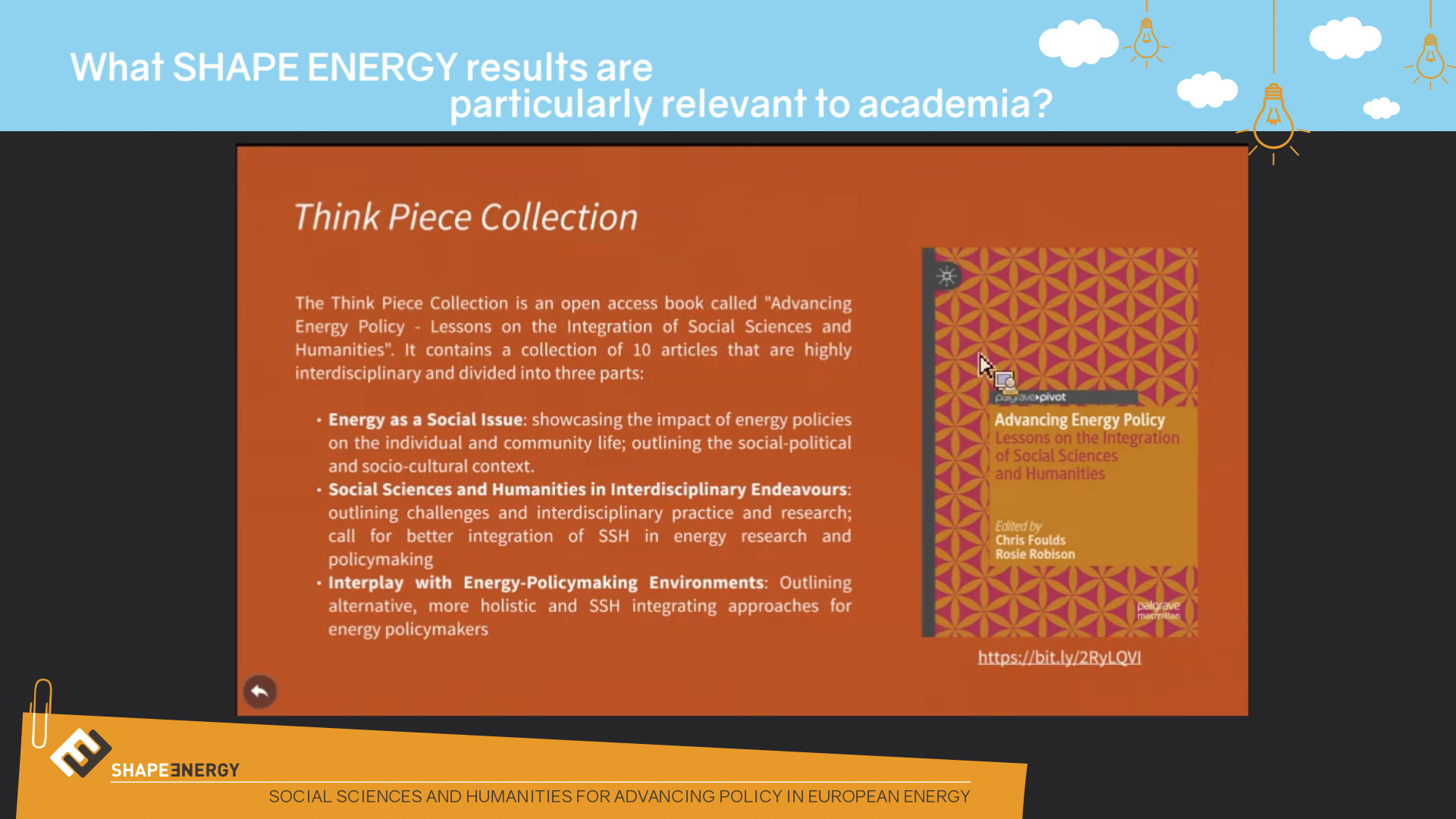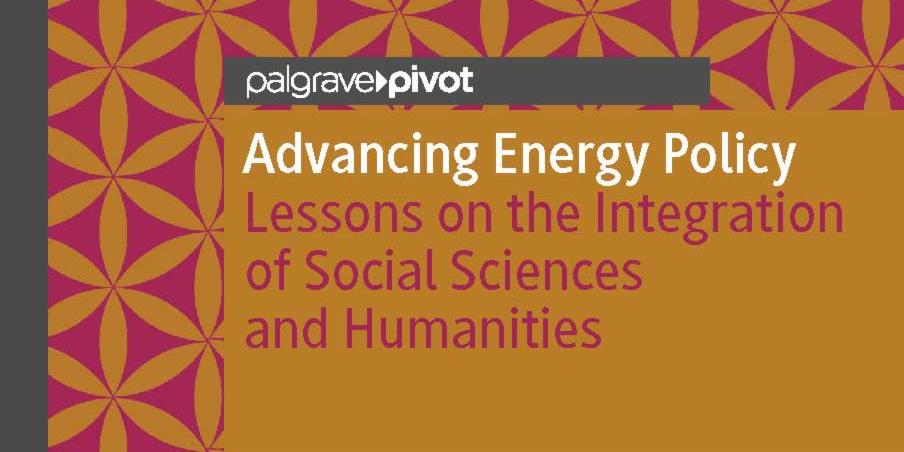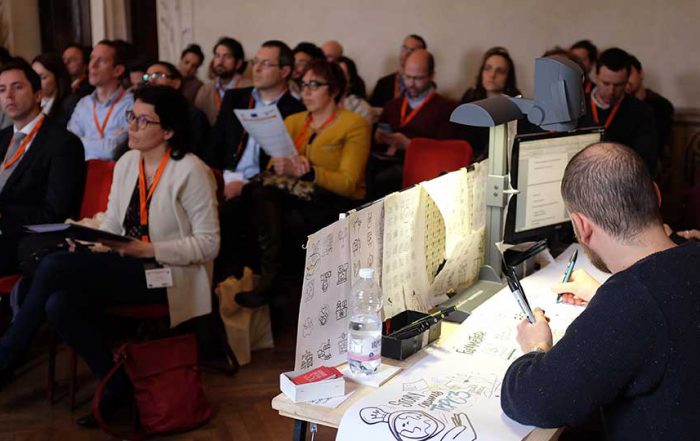
The value of Social Sciences and Humanities for energy research and practice
This page details key Social Sciences and Humanities overview resources for those working in the field of energy research and practice, whether in universities or beyond.
Energy research has traditionally been largely influenced by knowledge and disciplines from Science, Technology, Engineering and Mathematics (STEM), yet the ambitious goals of energy transitions concerning emissions reductions and renewable energy shares bring significant accompanying changes in social organisation. Thus, (as promoted by the European Commission (EC) Horizon2020 work programme on energy) knowledge from numerous fields of research is necessary to meet Europe’s energy goals, including strong representation from the active communities of energy-related Social Sciences and Humanities (energy-SSH) research.
The SHAPE ENERGY Platform (2017-2019) has produced a large number of resources to stimulate Europe’s research expertise in using and applying energy-SSH. How different energy-SSH disciplines contribute to overarching energy research problems, and concrete research methods related to this, are promoted in this set of key SHAPE ENERGY resources for researchers. Ultimately, these outputs aim to support interdisciplinary energy research that serves both the SSH and STEM communities, help SSH researchers advocate for the importance of their work, and may also prove valuable teaching resources.
Key SHAPE ENERGY resources for energy researchers:
1. Academic workshop and SHAPE ENERGY lexicon
Our academic workshop brought together high profile scholars to discuss the foundations of a European strategic research agenda for SSH in the energy field. The event contributed to several SHAPE energy outputs including the SHAPE ENERGY Lexicon. The Lexicon contains 20 energy-SSH related terms, together with scholars’ own definitions of these terms and what differences in these definitions may mean for diversity in research methods and approaches within the energy field.
The four SHAPE ENERGY annotated bibliographies across our core energy topics contain short overviews of over 650 articles, books and reports from across SSH disciplines, outlining key results, future research areas as well as areas of very active research and potential gaps.
3. Cross-cutting theme reports
The early Platform outputs of the cross-cutting theme reports aimed to provide accessible overviews of recent research and future recommendations on four salient energy-related SSH themes:
- energy and gender
- energy and multi-stakeholder interests
- energy justice
- energy and the active consumer
The Research Design Challenge set out to showcase how different SSH disciplines approach three scientific ‘reference problems’, namely (1) Control, (2) Change, and (3) Capacity-building in energy systems. Researchers based in 14 different European countries and representing 16 SSH disciplines came together through a SHAPE ENERGY funded call for papers and developed 13 research designs. These designs fostered interdisciplinary collaboration by channelling researchers’ attention towards the reference problem at hand, going beyond their disciplinary academic definitions and understandings.
5. ‘Advancing Energy Policy’ – Think piece collection
This open access book “Advancing Energy Policy – Lessons on the Integration of Social Sciences and Humanities” includes 11 papers written in collaborative author teams, as well as 3 forewords and 2 afterwords contributed by those in energy policy, practice and research. They investigated three major domains: ‘Energy as a Social Issue’, ‘Social Sciences and Humanities in Interdisciplinary Endeavours’, and ‘Interplay with Energy Policymaking Environments’ and embody an attempt to argue for how energy policy might practically be improved through better integration of energy-SSH and interdisciplinary cooperation.
6. Energy-SSH Researcher Database
This searchable, dynamic tool allows you to find researchers working in energy-related topics across the Social Sciences & Humanities, in Europe and other H2020-eligible countries. Keywords enable you to zoom in on those working on specific topics. Researchers and others can use this database to find collaborators, or add themselves in order to be found as expert partners and reviewers – indeed the European Commission and associated agencies are now using this tool.

Our Research and Innovation Agenda 2020-2030 offers insight into how SSH may be better integrated in cross-cutting energy projects. Read (and sign) SHAPE ENERGY’s 7 Principles to support our call for Horizon Europe to best utilise energy-SSH, and ensure that future projects incorporate SSH perspectives more deeply.
SELECTED NEWS POSTS & VIDEOS
Register now for the SHAPE ENERGY Pan-European conference
Join us for our end of project conference in Brussels! The one-day conference will be split in two: a morning policy summit and interactive afternoon sessions.
H2020 SANDPITS: Finding a common language
We wanted to facilitate interdisciplinary collaboration and productive working within SSH and STEM practitioners. But did they speak the same language?
PhD Internships Review: new publication available!
Our latest publication on how we brought Social Sciences & Humanities into H2020 energy projects through ESR internships is now available online.
Blog: Energy-SSH researchers unite (within our database)!
In this post our partners from ARU (UK) and NTNU (Norway) discuss the creation and evolution of our database.
Blog: Writing a SHAPE ENERGY bibliography on transport
By Kat Buchmann from Anglia Ruskin University, one of the authors of SHAPE ENERGY annotated bibliography on transport decarbonisation.
SHAPE ENERGY Call for Evidence results & response report
More than 200 participants responded to our open call for evidence over April-July 2017. Would you like to know who these contributors are and what
Exploring differences: ENERGY LEXICON available!
At SHAPE ENERGY in February 2017 we brought together an interdisciplinary group of leading European energy scholars to discuss definitions for energy-related keywords and phrases.
















